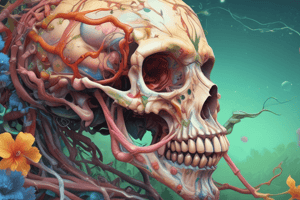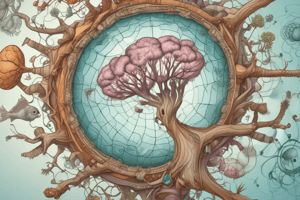Podcast
Questions and Answers
What is the study of the interactions between organisms and their environment?
What is the study of the interactions between organisms and their environment?
- Microbiology
- Ecology (correct)
- Botany
- Genetics
What is the primary function of carbohydrates in cells?
What is the primary function of carbohydrates in cells?
- To store and transmit genetic information
- To perform enzymatic and transport functions
- To provide energy and structure for cells (correct)
- To regulate cell growth and reproduction
What is the study of the evolutionary relationships between organisms?
What is the study of the evolutionary relationships between organisms?
- Cell Biology
- Phylogeny (correct)
- Theory of Evolution
- Species Diversity
Flashcards
What is Biology?
What is Biology?
Biology is the scientific study of life and living organisms, including their structure, function, and evolution.
What is Ecology?
What is Ecology?
Ecology is the study of how organisms interact with their environment.
Name a Biological Molecule.
Name a Biological Molecule.
Proteins are large molecules that perform many functions in living things, including transporting substances and enabling chemical reactions.
Study Notes
Definition and Scope
- Biology is the scientific study of life and living organisms, including their structure, function, growth, evolution, distribution, and taxonomy.
- It explores the diversity of life forms, from molecules to ecosystems.
Branches of Biology
- Botany: study of plants, including their structure, growth, development, reproduction, and evolution.
- Zoology: study of animals, including their structure, behavior, physiology, and evolution.
- Microbiology: study of microorganisms, such as bacteria, viruses, and other microbes.
- Ecology: study of the interactions between organisms and their environment.
- Genetics: study of heredity, genes, and genetic variation.
- Biochemistry: study of the chemical processes that occur within living organisms.
- Molecular Biology: study of the structure and function of biological molecules, such as DNA and proteins.
Biological Molecules
- Carbohydrates: provide energy and structure for cells (e.g., sugars, starches, cellulose).
- Proteins: perform a wide range of functions, including structural, enzymatic, and transport roles.
- Lipids: provide energy and structure for cells, and are involved in cell signaling (e.g., fats, oils, cholesterol).
- Nucleic Acids: store and transmit genetic information (e.g., DNA, RNA).
Cell Biology
- Cell Structure: cells consist of a plasma membrane, cytoplasm, and genetic material (DNA or RNA).
- Cellular Processes: cells perform various functions, including metabolism, growth, reproduction, and response to stimuli.
Evolution and Diversity
- Theory of Evolution: explains how species change over time through natural selection, genetic drift, and other mechanisms.
- Species Diversity: vast range of species, from bacteria to humans, each with unique characteristics and adaptations.
- Phylogeny: study of the evolutionary relationships between organisms.
Ecosystems and Ecology
- Ecosystems: communities of organisms and their physical environment, interacting and exchanging energy and resources.
- Ecological Principles: concepts such as population growth, competition, predation, and symbiosis shape ecosystem dynamics.
- Ecosystem Services: ecosystems provide essential services, including air and water purification, soil formation, and climate regulation.
Definition and Scope
- Biology is the scientific study of life and living organisms, covering structure, function, growth, evolution, distribution, and taxonomy.
- It explores the diversity of life forms, from molecules to ecosystems.
Branches of Biology
- Botany: studies plants, including structure, growth, development, reproduction, and evolution.
- Zoology: studies animals, including structure, behavior, physiology, and evolution.
- Microbiology: studies microorganisms like bacteria, viruses, and other microbes.
- Ecology: studies interactions between organisms and their environment.
- Genetics: studies heredity, genes, and genetic variation.
- Biochemistry: studies chemical processes within living organisms.
- Molecular Biology: studies structure and function of biological molecules, such as DNA and proteins.
Biological Molecules
- Carbohydrates: provide energy and structure for cells, e.g., sugars, starches, and cellulose.
- Proteins: perform various functions, including structural, enzymatic, and transport roles.
- Lipids: provide energy and structure for cells, and are involved in cell signaling, e.g., fats, oils, and cholesterol.
- Nucleic Acids: store and transmit genetic information, e.g., DNA and RNA.
Cell Biology
- Cell Structure: cells consist of a plasma membrane, cytoplasm, and genetic material (DNA or RNA).
- Cellular Processes: cells perform functions like metabolism, growth, reproduction, and response to stimuli.
Evolution and Diversity
- Theory of Evolution: explains how species change over time through natural selection, genetic drift, and other mechanisms.
- Species Diversity: vast range of species, from bacteria to humans, each with unique characteristics and adaptations.
- Phylogeny: studies evolutionary relationships between organisms.
Ecosystems and Ecology
- Ecosystems: communities of organisms and their physical environment, interacting and exchanging energy and resources.
- Ecological Principles: concepts like population growth, competition, predation, and symbiosis shape ecosystem dynamics.
- Ecosystem Services: ecosystems provide essential services, including air and water purification, soil formation, and climate regulation.
Studying That Suits You
Use AI to generate personalized quizzes and flashcards to suit your learning preferences.




